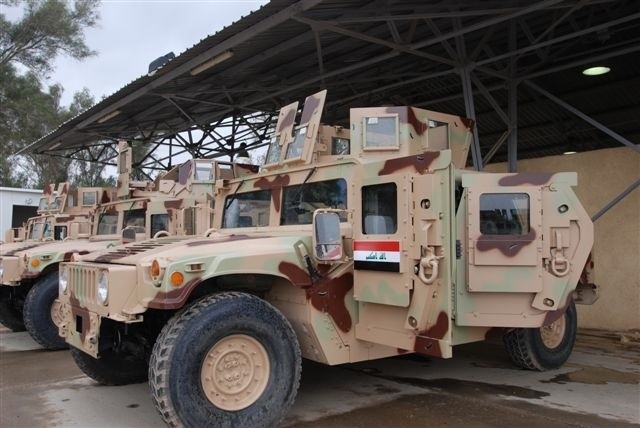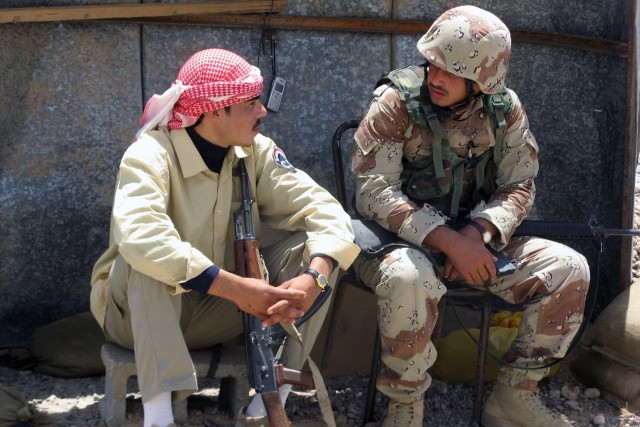WASHINGTON (Army News Service, Jun. 26, 2008) -- The Iraqi army has grown by 60 percent in the last year, and stands now at nearly 180,000 soldiers. The army is also now training its own soldiers, and its effectiveness in combat has allowed it to concentrate more on improving logistics and supply chains.
Brig. Gen. Steven L. Salazar said that during the last year, the Iraqi army has built up internal momentum and has taken the reins for themselves on many soldier training functions.
"More and more the Iraqis are doing training for themselves now," Salazar said.
He serves as deputy commanding general, Coalition Army Advisory Training Team, Multi-National Security Transition Command-Iraq. The organization is responsible for training and equipping the Iraqi army.
"Basic training is conducted by the Iraqi army, military occupational specialty qualification training is conducted by the Iraqi army, and noncommissioned officer training -- at all three levels -- is being conducted by the Iraqi army now," he added.
The NCO training conducted now in Iraq includes a corporal's course, a sergeant's course, and a squad leader's course. New to the regiment is a master instructor course also taught by Iraqi army NCOs. Similarly, officer courses are also being conducted by the Iraqi army.
New equipment is pouring into the Iraqi army, including weapons, radios and transportation. At the Iraqi Army Service Support Institute, level-3 maintenance and support soldiers are now being trained to repair that new equipment.
"Those soldiers will tell you they can take an entire Humvee apart down to nothing and put it back together," he said. "They can take generators apart and put them back together as well. And at the bomb disposal school they are taking damaged robots -- part of the bomb disposal companies in the Iraqi army -- and completely repairing them and putting them back into the fight."
Soon, said Salazar, the new army will also engage in collective unit training. The Warfighter Program will take battalions of Iraqi army soldiers out of the fight and into centers where they can conduct "home station training" in much the same way U.S. Soldiers do.
"This is really a milestone I think, and the beginning of something big as we transition from the counter-insurgency fight to ultimately an army that is conducting training," Salazar said.
Taking time to train is a kind of luxury for Iraqi soldiers, who have been embroiled in the fight. But it is their efforts, said Salazar, that enabled them to create that opportunity.
"We have been so busy with fighting the insurgency that there really has been little or no time for conducting training at a larger organizational level," he said. "But thanks to the success of the Iraqi operations, which has created such a low-level of violence, we are at now ready for (the Warfighter Program.)"
During upcoming unit training, Iraqi soldiers may have the opportunity to use some of the new equipment the army has procured, including 80,000 new M-16 rifles; 8,500 refurbished Humvee vehicles; and more than 12,000 Single-Channel Ground-Air Radio Systems, or SINGARS radios. The systems have been procured either through the Iraqi Security Forces Fund, or through foreign military sales.
But the new equipment has great impact on the way the Iraqi army operates and is perceived by the public. It also has a great effect on soldier morale, Salazar said.
"When you see a group of Iraqi soldiers driving around in a Humvee, and they get to operate it with their own markings on it, the Iraqi flag on it, it does a tremendous amount for the pride of the Iraqi soldier and consequently his performance," Salazar said. "It also has a tremendous impact on the local population as they see their soldiers operating this kind of professional modern equipment. So what these purchases do for the Iraqi army are really tremendous."
Salazar said the Iraqi army has shown more independence in conducting large operations in places like Basra, Sadr City, Mosul and Al Amara. But the service still must work on two key areas. The first, he said is enabler elements.
"We built a tremendous maneuver capability with considerable combat power in the Iraqi army based on the number of battalions and brigades -- up to 13 divisions," he said. "We still need to grow those enablers, such as intelligence, surveillance and reconnaissance formations and engineer formations."
Salazar also said the Iraqi army must work on stronger logistics. To aid in that effort, the coalition is working to provide logistics facilities for each Iraqi army division. They are also in the process of building national depots, including the Taji National Depot to provide national-level maintenance, and the Taji National Supply Depot.
"Those are in the process of being built and will be complete by and large by the end of this year," he said. "We expect self sustainment, in terms of logistics by the middle of 2009."
Despite growing pains, Salazar said the Iraqi army is impressive and that those soldiers are driven by many of the same things as American soldiers.
"I think the Iraqi army has been tremendously successful," he said. "You can see evidence of that by the successful operations taking place -- there is still a considerable threat out there. And in many aspects those soldiers are much like the American soldiers. They have a sense of duty and country, also a sense of economics and an aspiration for opportunity. I think what most Iraqis see is opportunity to serve their nation and to support their families."




Social Sharing